Memory Scaling on Ryzen 7 with Team Group's Night Hawk RGB
by Ian Cutress & Gavin Bonshor on September 27, 2017 11:05 AM ESTCPU Performance, Short Form
For our quick reviews, we use our short form testing method.
Video Conversion – Handbrake v1.0.2: link
Video transcoding (both encode and decode) is a hot topic in performance metrics as more and more content is being created. First consideration is the standard in which the video is encoded, which can be lossless or lossy, trade performance for file-size, trade quality for file-size, or all of the above can increase encoding rates to help accelerate decoding rates. Alongside Google's favorite codec, VP9, there are two others that are taking hold: H264, the older codec, is practically everywhere and is designed to be optimized for 1080p video, and HEVC (or H265) that is aimed to provide the same quality as H264 but at a lower file-size (or better quality for the same size). HEVC is important as 4K is streamed over the air, meaning less bits need to be transferred for the same quality content.
Handbrake is a favored tool for transcoding, and so our test regime takes care of three areas.
Low Quality/Resolution H264: Here we transcode a 640x266 H264 rip of a 2 hour film, and change the encoding from Main profile to High profile, using the very-fast preset.
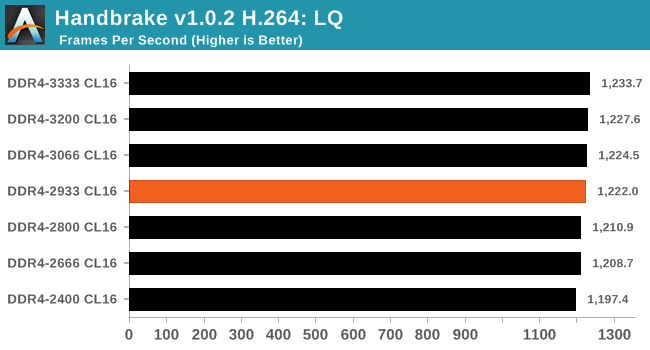
High Quality/Resolution H264: A similar test, but this time we take a ten-minute double 4K (3840x4320) file running at 60 Hz and transcode from Main to High, using the very-fast preset.
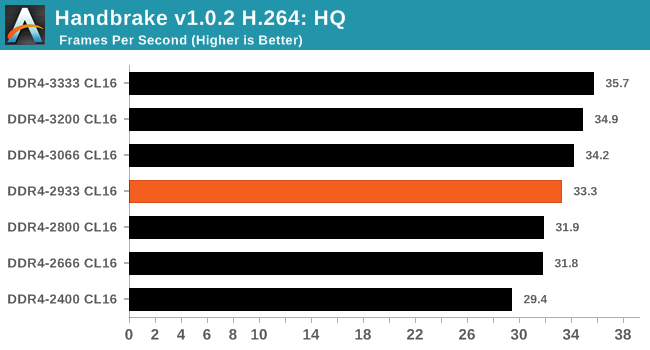
HEVC Test: Using the same video in HQ, we change the resolution and codec of the original video from 4K60 in H264 into 4K60 HEVC.
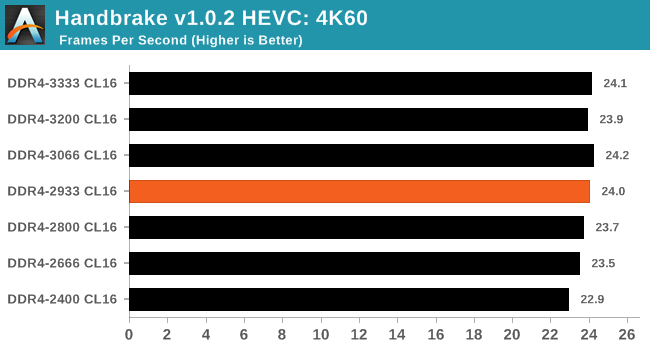
The biggest gains in Handbrake came in the HQ test where we gained up to an extra +21% in performance for DDR4-3333 over DDR4-2400. The fact that we don't see the same gains in the HEVC test is likely down to the algorithm.
Compression – WinRAR 5.40: link
For the 2017 test suite, we move to the latest version of WinRAR in our compression test. WinRAR in some quarters is more user friendly that 7-Zip, hence its inclusion. Rather than use a benchmark mode as we did with 7-Zip, here we take a set of files representative of a generic stack (33 video files in 1.37 GB, 2834 smaller website files in 370 folders in 150 MB) of compressible and incompressible formats. The results shown are the time taken to encode the file. Due to DRAM caching, we run the test 10 times and take the average of the last five runs when the benchmark is in a steady state.
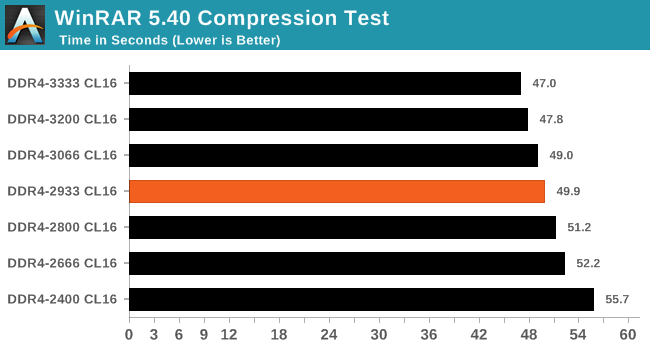
Like with Handbrake, the system seemed to scale pretty well in WinRAR with a ~16% performance gain going from DDR4-2400 to DDR4-3333.
3D Movement Algorithm Test v2.1
This is the latest version of the self-penned 3DPM benchmark. The goal of 3DPM is to simulate semi-optimized scientific algorithms taken directly from my doctorate thesis. Version 2.1 improves over 2.0 by passing the main particle structs by reference rather than by value, and decreasing the amount of double->float->double recasts the compiler was adding in. It affords a ~25% speed-up over v2.0, which means new data.
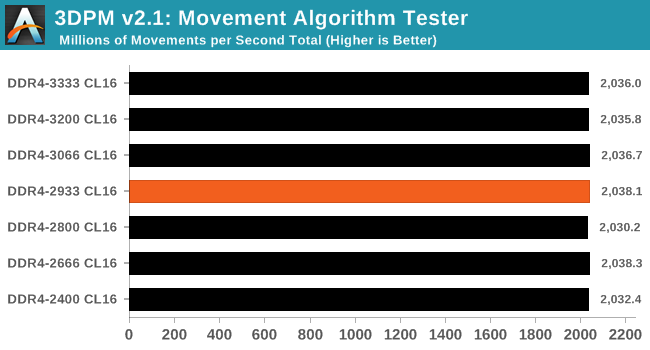
Although more of a raw CPU benchmark, it shows here that memory isn’t a massive factor, as regardless of memory speed, we encountered marginal performance gains.
POV-Ray 3.7: link
Another regular benchmark in most suites, POV-Ray is another ray-tracer but has been around for many years. It just so happens that during the run up to AMD's Ryzen launch, the code base started to get active again with developers making changes to the code and pushing out updates. Our version and benchmarking started just before that was happening, but given time we will see where the POV-Ray code ends up and adjust in due course.
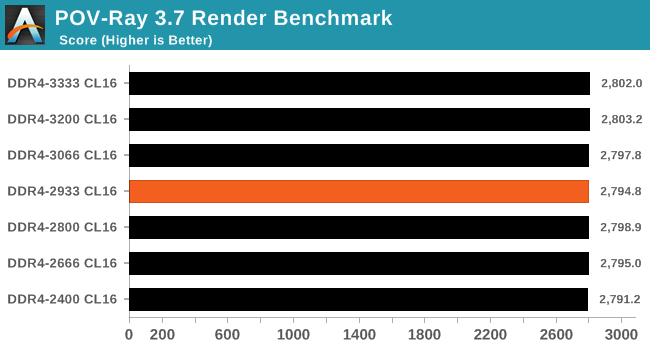
POV-Ray might be a fruitful benchmark for testing memory stability, but our performance variation between memory speeds was within the margin of error.
7-Zip 9.2: link
One of the freeware compression tools that offers good scaling performance between processors is 7-Zip. It runs under an open-source licence, is fast, and easy to use tool for power users. We run the benchmark mode via the command line for four loops and take the output score.
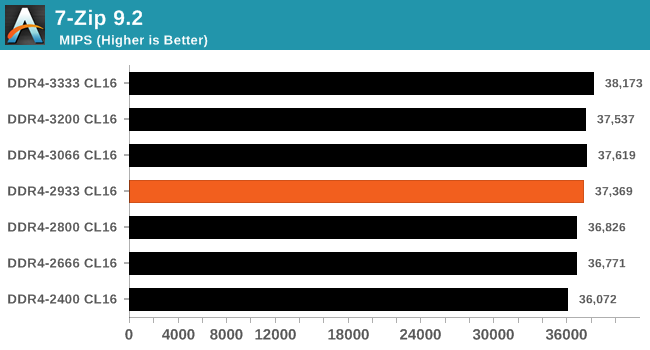
Some compression tools can be susceptible to memory performance and it shows in our results such as WinRAR. 7-zip has a small performance boost as we rise up through the stack, although the differences above DDR4-2666 are fairly minimal.










65 Comments
View All Comments
Arbie - Wednesday, September 27, 2017 - link
While you're at it, reinstall the spellchecker on his PC. Looks like the DRAM testing broke it.lagittaja - Friday, September 29, 2017 - link
Ian, .vodka is right about this, you should take a closer look at the sub-timings. Maybe get in touch with The Stilt?.vodka - Sunday, October 1, 2017 - link
As luck would have it, someone did an excellent piece on what this article tried to explore.https://www.youtube.com/watch?v=S6yp7Pi39Z8
Here's a proper look at how timings and memory speed improves Ryzen performance, on a 3.9GHz 1700x vs a 5GHz 7700k.
He's using a Vega (much faster than a GTX 980), comparing 2666C16 auto timings, The Stilt's timings for 3200C14 and 3466C14, and 3600C16 with auto subtimings. All B-die.
Screenshots of the results in five games: https://imgur.com/a/EapgO
Unsurprisingly, auto subtimings are a disaster with 2666C16 and 3600C16 performing mostly the same in these five games (what you've found in your article), and Ryzen's true performance is hidden in tight subtimings that you have to manually configure and test for. The results are more than worth it.
Please, have a look in this direction. Get a Crosshair VI Hero and some proper high speed B-die memory capable of those timing sets. Make a follow up article...
Hopefully future Ryzen iterations will not be as reliant on fast memory to perform like that.
Zeed - Thursday, September 28, 2017 - link
OO You ware faster Maybe they should test RYZEN memory kits like this one ??https://www.overclockers.co.uk/team-group-dark-pro...
Or maybe Gskill Ryzen kit ??
peevee - Wednesday, September 27, 2017 - link
"he DDR4-2600 value can certainly be characterized as the lowest number near to 45-46% FPS"Nonsense alert.
Ian Cutress - Wednesday, September 27, 2017 - link
My mistake, edited the sentence one way, then changed my mind and went another route and forgot to remove the %. Updated.Ken_g6 - Wednesday, September 27, 2017 - link
And shouldn't that have been DDR4-2400?Jacerie - Wednesday, September 27, 2017 - link
Why would you only use a Nvidia gfx card in the test bed if the Infinity Fabric is designed to integrate with AMD GPUs as well. Looks like you need to go back to the bench and run these tests again with AMD gfx to get the true results.Dr. Swag - Wednesday, September 27, 2017 - link
Memory clock speed doesn't affect the IF clock speed on AMD GPUsZeDestructor - Wednesday, September 27, 2017 - link
GPUs don't talk to the CPU using IF, only PCIe. Well, onc consumer desktop anyways - presumably AMD has some crazy IF-IF under testing internally to compete against NVLink, CAPI, OmniPath and InfiniBand